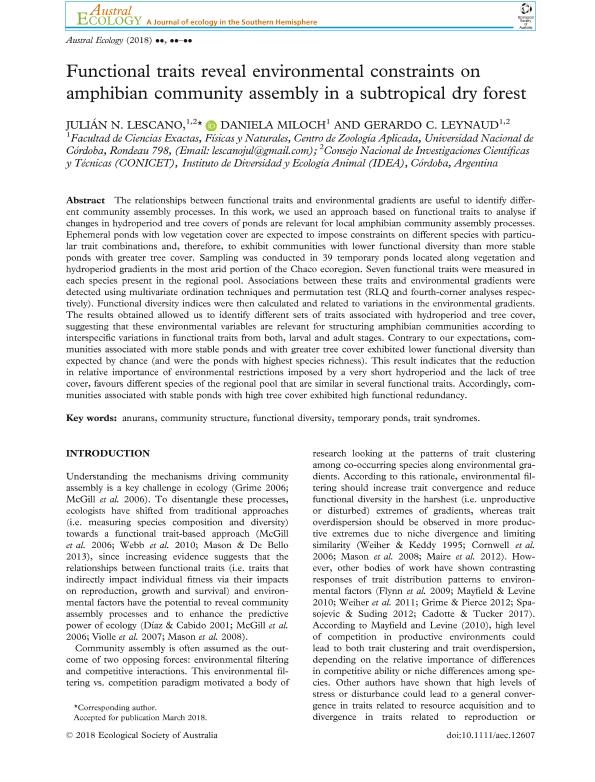Mostrar el registro sencillo del ítem
dc.contributor.author
Lescano, Julián Norberto

dc.contributor.author
Miloch, Daniela

dc.contributor.author
Leynaud, Gerardo Cristhian

dc.date.available
2019-11-27T17:49:25Z
dc.date.issued
2018-09
dc.identifier.citation
Lescano, Julián Norberto; Miloch, Daniela; Leynaud, Gerardo Cristhian; Functional traits reveal environmental constraints on amphibian community assembly in a subtropical dry forest; Wiley Blackwell Publishing, Inc; Austral Ecology; 43; 6; 9-2018; 623-634
dc.identifier.issn
1442-9985
dc.identifier.uri
http://hdl.handle.net/11336/90668
dc.description.abstract
The relationships between functional traits and environmental gradients are useful to identify different community assembly processes. In this work, we used an approach based on functional traits to analyse if changes in hydroperiod and tree covers of ponds are relevant for local amphibian community assembly processes. Ephemeral ponds with low vegetation cover are expected to impose constraints on different species with particular trait combinations and, therefore, to exhibit communities with lower functional diversity than more stable ponds with greater tree cover. Sampling was conducted in 39 temporary ponds located along vegetation and hydroperiod gradients in the most arid portion of the Chaco ecoregion. Seven functional traits were measured in each species present in the regional pool. Associations between these traits and environmental gradients were detected using multivariate ordination techniques and permutation test (RLQ and fourth-corner analyses respectively). Functional diversity indices were then calculated and related to variations in the environmental gradients. The results obtained allowed us to identify different sets of traits associated with hydroperiod and tree cover, suggesting that these environmental variables are relevant for structuring amphibian communities according to interspecific variations in functional traits from both, larval and adult stages. Contrary to our expectations, communities associated with more stable ponds and with greater tree cover exhibited lower functional diversity than expected by chance (and were the ponds with highest species richness). This result indicates that the reduction in relative importance of environmental restrictions imposed by a very short hydroperiod and the lack of tree cover, favours different species of the regional pool that are similar in several functional traits. Accordingly, communities associated with stable ponds with high tree cover exhibited high functional redundancy.
dc.format
application/pdf
dc.language.iso
eng
dc.publisher
Wiley Blackwell Publishing, Inc

dc.rights
info:eu-repo/semantics/openAccess
dc.rights
Atribución-NoComercial-CompartirIgual 2.5 Argentina (CC BY-NC-SA 2.5 AR)
dc.rights.uri
https://creativecommons.org/licenses/by-nc-sa/2.5/ar/
dc.subject
ANURANS
dc.subject
COMMUNITY STRUCTURE
dc.subject
FUNCTIONAL DIVERSITY
dc.subject
TEMPORARY PONDS
dc.subject
TRAIT SYNDROMES
dc.subject.classification
Ecología

dc.subject.classification
Ciencias Biológicas

dc.subject.classification
CIENCIAS NATURALES Y EXACTAS

dc.title
Functional traits reveal environmental constraints on amphibian community assembly in a subtropical dry forest
dc.type
info:eu-repo/semantics/article
dc.type
info:ar-repo/semantics/artículo
dc.type
info:eu-repo/semantics/publishedVersion
dc.date.updated
2019-10-16T14:25:39Z
dc.identifier.eissn
1442-9993
dc.journal.volume
43
dc.journal.number
6
dc.journal.pagination
623-634
dc.journal.pais
Reino Unido

dc.journal.ciudad
Londres
dc.description.fil
Fil: Lescano, Julián Norberto. Consejo Nacional de Investigaciones Científicas y Técnicas. Centro Científico Tecnológico Conicet - Córdoba. Instituto de Diversidad y Ecología Animal. Universidad Nacional de Córdoba. Facultad de Ciencias Exactas Físicas y Naturales. Instituto de Diversidad y Ecología Animal; Argentina
dc.description.fil
Fil: Miloch, Daniela. Consejo Nacional de Investigaciones Científicas y Técnicas. Centro Científico Tecnológico Conicet - Córdoba. Instituto de Diversidad y Ecología Animal. Universidad Nacional de Córdoba. Facultad de Ciencias Exactas Físicas y Naturales. Instituto de Diversidad y Ecología Animal; Argentina
dc.description.fil
Fil: Leynaud, Gerardo Cristhian. Consejo Nacional de Investigaciones Científicas y Técnicas. Centro Científico Tecnológico Conicet - Córdoba. Instituto de Diversidad y Ecología Animal. Universidad Nacional de Córdoba. Facultad de Ciencias Exactas Físicas y Naturales. Instituto de Diversidad y Ecología Animal; Argentina
dc.journal.title
Austral Ecology

dc.relation.alternativeid
info:eu-repo/semantics/altIdentifier/url/https://onlinelibrary.wiley.com/doi/abs/10.1111/aec.12607
dc.relation.alternativeid
info:eu-repo/semantics/altIdentifier/doi/http://dx.doi.org/10.1111/aec.12607
Archivos asociados
